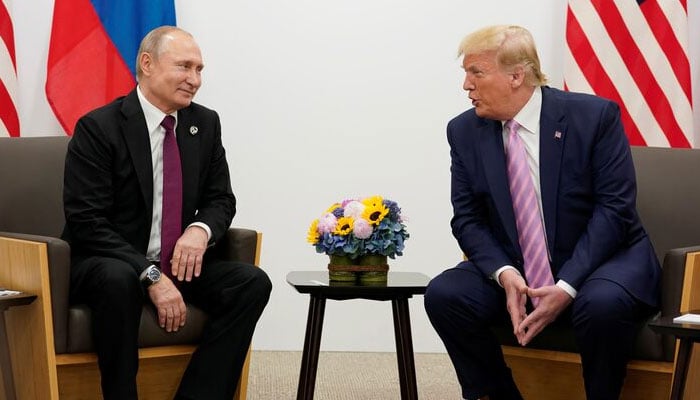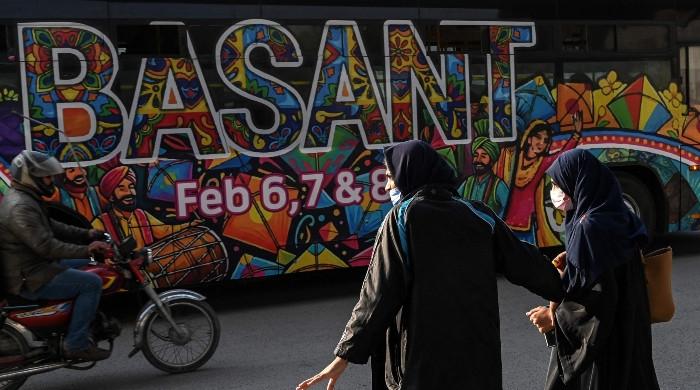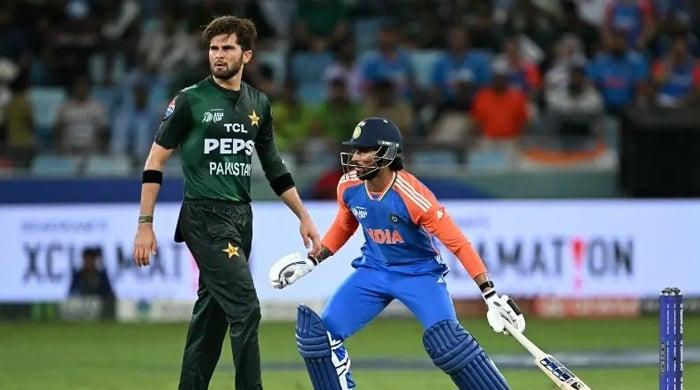What to expect from Trump-Putin summit?
We have regular contacts with our American colleagues, says Russian Consul General in Karachi
August 12, 2025

After having six telephone calls in seven-and-a-half months, the president of the United States of America and his Russian counterpart are meeting on 15 August.
For many good reasons, there is some optimism in the air as Donald Trump hosts Vladimir Putin in Alaska — a former Russian region that only became a US state in 1959.
Notably, it’s their first meeting since 2019. And it will be the first visit to the United States of America by the Russian president in 10 years.
In an exclusive interview with Andrey Viktorovich Fedorov, the Consul General of the Russian Federation in Karachi, Geo News asked a few questions about his expectations for the summit.
Question: President Trump had vowed to pursue peace with Tehran. Yet, he bombed Iran. For a long time, he has been seeking to stop the war between Russia and Ukraine. As both leaders meet in Alaska, how far does Moscow trust President Trump?
Andrey V Fedorov: Russian authorities never pursue policies that harm the national interests of the Russian Federation or compromise the security of our nation. Today, we see that our colleagues in Washington are open to continuing an honest conversation, which takes into account the need to make the Ukraine settlement part of an effort to promote pan-European security based on a balance of legitimate interests of all the countries involved in this process.
We have regular contacts with our American colleagues at various levels, including telephone conversations between our presidents, contacts between Marco Rubio and the Minister of Foreign Affairs Mr Sergey Lavrov, and through United States Special Envoy Steve Witkoff. It is thanks to President Donald Trump’s insistence that the Kiev regime accepted our proposal to resume the Istanbul talks.
Moscow and Washington are engaged in a meaningful discussion on the Ukraine topic, which has been quite useful and effective. However, we will not compromise on Russia’s legitimate interests and will make sure that our concerns are considered.
Question: What is the real situation on the ground as far as daily fatalities and destruction is concerned?
Andrey V Fedorov: The Russian Armed Forces firmly hold the initiative in all directions in the Special Military Operation zone. In late June, the Russian military completely liberated the territory of the Lugansk People’s Republic and is close to completely liberating the territory of the Donetsk People's Republic.
According to information from the reports of the Russian Defence Ministry, in July, Ukraine lost about 36,000 fighters, in the remaining six months of 2025 — more than 265,000. During the last exchange of dead bodies carried out within the framework of the agreements concluded by the Russian and Ukrainian delegations at the talks in Istanbul, Russia returned 19 bodies of fallen soldiers. In exchange, Moscow handed over to Kyiv 1,000 bodies of Ukrainian Armed Forces soldiers.
Russia’s success in reaching the goals of the Special Military Operation is undoubtfully proved by the eagerness of the European leaders to push us to a ceasefire and stop the offensive of the Russian Army.
Question: There are reports that a number of mercenaries are fighting on both sides. Can such people be trusted, as they may be on the payroll of the adversary?
Andrey V Fedorov: Western military personnel have been working in Ukraine for a long time; this is part of the hybrid war of Nato and the European Union against our country. There are mercenaries, so-called volunteers, and there are also instructors, without whom it would be impossible for the Ukrainian Army to utilise weapons provided by the West. The Investigative Committee of Russia has identified over 3,500 mercenaries from 70 countries participating in the hostilities on the Ukrainian side. To date, decisions have been made to prosecute 965 militants; 721 have been put on the international wanted list, 282 arrested in absentia, and 134 convicted.
As for the Russian Federation, the president has repeatedly emphasized that there is no need for the Russian Army to rely on mercenaries. Russian soldiers are fighting bravely to defend their motherland. However, it is not a secret that some North Korean officers take part in the special military operation, and this fact does not in any way violate any provisions of international law because the Treaty on Comprehensive Strategic Partnership between the Russian Federation and the Democratic People's Republic of Korea was signed last year. Among other things, this treaty stipulates providing assistance to each other in the event that one of the countries is attacked militarily.
Question: Russia has objected to the legitimacy of the Ukrainian president. With that background, who would Russia talk to in Ukraine that can also give sovereign guarantees?
Andrey V Fedorov: The Russian side is ready to meet with anyone to whom the Ukrainian state trusts to conduct negotiations, including Zelensky. The main issue is who will sign the documents. The term of Mr Zelensky has already expired, but new elections have not taken place, although the country's constitution does not provide for an extension of the president's term in the event of martial law. However, this issue is to be dealt with in accordance with the Ukrainian constitution.
Question: What are the chances that the United States of America will cut a deal with Iran and lift sanctions? After all, it may use Iran’s oil as a weapon against the Russian economy.
Andrey V Fedorov: We observe with concern the persistent attempts by politically motivated and destructively inclined forces to destabilise the situation surrounding the Iranian nuclear programme under spurious pretexts, seeking to persuade the international community of supposed threats it allegedly poses.
We remain resolute in our conviction that the current fragile ceasefire, established following the escalation in June, necessitates an entirely different approach. The world has borne witness to the consequences of aggressive ambitions and actions pursued under the slogan of a “final resolution to the Iranian issue”. We assert that, at this critical juncture, Western counterparts must abandon self-serving ambitions and finally redirect their energies not towards destruction, but towards vigorous negotiations aimed at dispelling baseless suspicions and warnings regarding Iran’s peaceful nuclear programme. This must be grounded in international law, with due regard for Iran’s legitimate interests under the Treaty on the Non-Proliferation of Nuclear Weapons, including its right to uranium enrichment for civilian purposes under IAEA safeguards.
Russia is actively pursuing this objective, closely coordinating positions with Iranian and Chinese partners. We will cooperate with China on the international stage to prevent the West from using Iran’s nuclear programme to put political pressure on Tehran.
Question: India is under immense US pressure to ditch its long-time ally, Russia, from buying oil. Has Moscow lost New Delhi as a big trading partner?
Andrey V Fedorov: An unprecedented number of sanctions and other illegal restrictions have been imposed on Russia and its international partners, making the threat of new sanctions a routine matter. Knowledgeable of our partners, I cannot see how they can give up their independent policy, the policy of observing agreements achieved both through two-way channels and under multilateral formats.
There is a Russian proverb: “Do not dig a pit for others…” By imposing sanctions, using tariff policy, the blow is being dealt to the global economy. Objective analysts, economists, and political scientists concede that the primary casualty of this sanctions war is its very architect.
Question: As far as the Pak-Russia relationship is concerned, some big promises are made in the last few months. How practical is it to give a new soul to the Steel Mills?
Andrey V Fedorov: Pakistan Steel Mills was built in 1985 with the help of the USSR and became a symbol of cooperation between the two countries, as well as an important contribution of Russia to the industrialisation of Pakistan. As you might know, during the 9th Meeting of the Russia-Pakistan Intergovernmental Commission on Trade, Economic, Scientific and Technical Cooperation in December 2024, steps were agreed to prepare a roadmap for the construction of a new Steel Mill in Karachi. However, it is a long process. As for the current situation, the sides are discussing the concept of the new Steel Mill on the level of technical experts, making all the necessary calculations.
Disclaimer: The viewpoints expressed in this piece are the writer's own and don't necessarily reflect Geo.tv's editorial policy.
The author is Controller News at Geo News. He posts on X at @NasimHaider2 and can be reached at [email protected]











